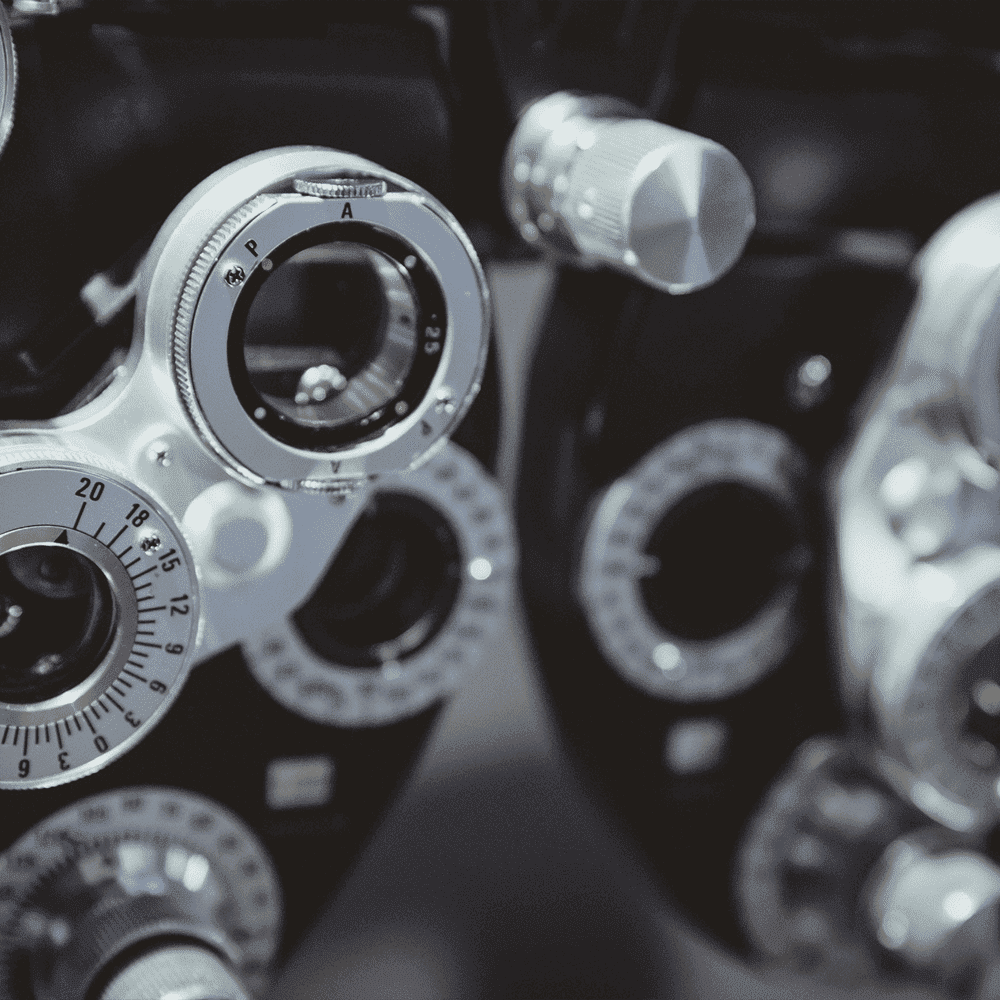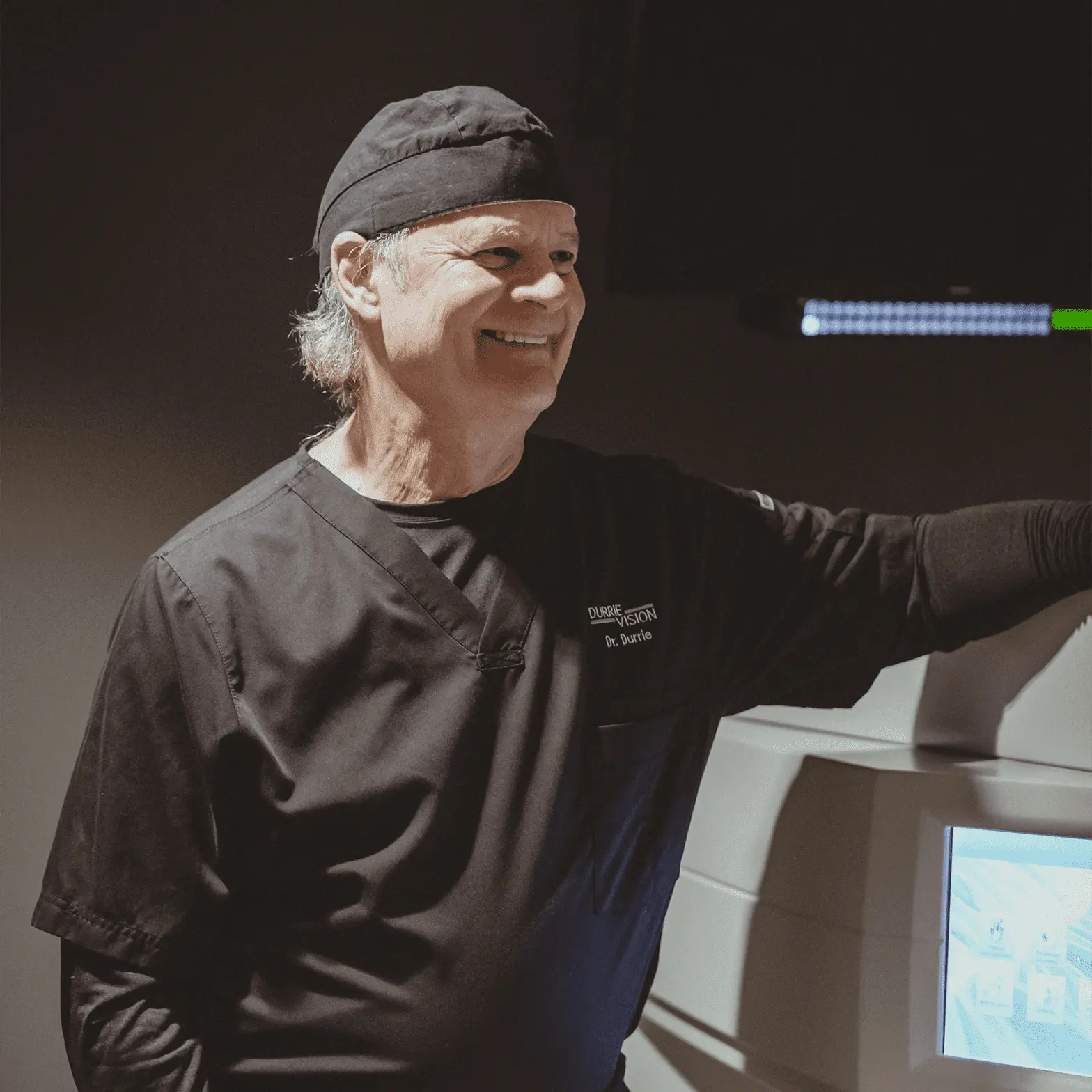SBK Advanced LASIK Surgery
Improve Your Vision and Quality of Life with LASIK from Kansas City’s Durrie Vision
Ditch the daily struggles with glasses and contacts and discover the life-changing benefits of SBK Advanced LASIK. This quick, safe, and effective procedure has helped millions of people achieve clear vision without the need for corrective lenses.
LASIK treats:
Nearsightedness, farsightedness, and astigmatism.
"The entire process was seamless and professional, and the results are absolutely unbelievable."
– Kristin

Is LASIK Right for You?
SBK Advanced LASIK surgery from Durrie Vision is an excellent solution for someone who is at least 18 years old with a stable vision prescription for a year. Factors that can affect candidacy are the degree of the refractive error and the thickness and shape of the cornea, which are all determined during testing.
You should also have healthy eyes with no underlying conditions such as cataracts, glaucoma, or corneal diseases. If you have any of these conditions, they must be treated and stabilized before LASIK can be considered.
Why Choose Durrie Vision for LASIK in Kansas City?
Recognized as the leading pioneers in vision correction, Durrie Vision’s innovations in SBK (Sub-Bowman’s Keratomileusis) Advanced LASIK surgery set the standard for the industry. Developed by our founder Dr. Durrie, this all-laser technique delivers exceptional, customized results with a quick recovery time.
Our state-of-the-art facility in Overland Park is equipped with the latest diagnostic and treatment technology, ensuring that your procedure will be safe, precise, and effective.
What to Expect Before, During, and After LASIK Surgery
Our friendly and knowledgeable staff will guide you through the entire process, answering your questions and calming any nerves.
SBK Advanced LASIK is a 10-to-15-minute outpatient procedure. The laser portion of the treatment only lasts a few seconds.
You will need a driver on the day of surgery and for your one-day post-op appointment.
After the one-day post-op, patients can typically return to their regular daily activities, with a few restrictions.
You can expect your vision to be blurry for the first few hours after surgery, followed by a rapid and significant improvement in vision.
Our doctors follow our patients' recovery with regular post-op visits throughout the year following LASIK.
Benefits of LASIK Surgery
Improved Eyesight
Enjoy immediate results and easily partake in daily activities, including athletics, working on the computer, and traveling.
Safer vision
Reduce your risk of contacts-related eye infections and wake up able to see.
Savings
Free yourself from the lifetime cost of new glasses, contacts, and their accessories.
Get time back in your day
After a fast recovery time, you are free from glasses, contact lenses, and the maintenance they require.
LASIK Surgery FAQs
It’s normal to have many questions about SBK Advanced LASIK surgery. Here are some that are most frequently asked.
I have astigmatism. Can I still get LASIK?
Yes! In fact, this procedure is an excellent treatment for astigmatism. SBK eliminates astigmatism by flattening or steepening the curvature of the cornea.
What if I’m not a candidate for LASIK?
Although LASIK is the most commonly performed vision-correction procedure at Durrie Vision, it’s not the only one that can help you see better. Advancements in vision correction mean there are new procedures, techniques and technologies, leading to more options for more people. If your Advanced Ocular Analysis at Durrie Vision reveals you aren’t a candidate, our refractive surgeon can recommend other procedures that are appropriate for you.
How soon after LASIK can I return to normal activities?
Good news! One of the greatest benefits of LASIK is the quick recovery time. Although you can expect your vision to be blurry the first few hours after the procedure, you should be able to resume work and normal activities the following day.
What are the risks of LASIK?
The decision to have a vision correction procedure is a personal one. Rest assured, serious complications with LASIK surgery are extremely rare. Many of them can be reduced or eliminated through our thorough pre-op diagnostic testing.
Do LASIK results wear off?
One of the most common misconceptions about this procedure is that it wears off, but the reality is that it lasts. That’s because the eye has two lenses – the cornea on the front surface and the lens inside. LASIK permanently changes the cornea. Natural changes in the eye’s internal lens can affect near vision beginning in your 40s, and technologies exist to improve vision when those changes occur.

Get Started with a Free LASIK Consultation
Our Advanced Ocular Analysis (AOA) is the first step in determining the best vision correction procedure for you. Your eyes will be examined using the most advanced diagnostic testing and technologies available. You will then meet with one of our experienced doctors who will discuss your analysis, leaving with a comprehensive AOA report as well as our recommendations for treatment including recovery times, costs, and financing options.
Don’t just take our word for it!
Schedule a Free Consultation
During your free consultation visit, you will meet with an experienced refractive surgeon who will discuss your results along with a custom recommendation for treatment.
Take the LASIK Eligibility Assessment
Are you a candidate for laser vision correction? Let's find out. Take our 60-second online test to see what procedure might be the best option for your vision and lifestyle.
From The Experts At Durrie Vision
Why Is My Eye Twitching? And How LASIK Can Help
Find Out the Source of Your Discomfort and Get Relief Feeling your eye twitch brings up many feelings - and a lot of time spent searching the internet. First, you worry about whether your eye twitch is “normal” or if it’s the sign of a medical issue. You wonder what’s...
Any Time of Year Is a Good Time for LASIK
Experience the Benefits of LASIK Eye Surgery in Every Season When you’re stuck with contacts or eye glasses, every season has its downsides. In winter, it’s fogged lenses and dry eyes. In summer, you never truly get to see while you swim. If you’re sick of your...
Celebrate Save Your Vision Month This March with LASIK
Make a Commitment to Eye Health with LASIK Eye Surgery and 3 More Healthy Practices Save Your Vision Month is an initiative created by the American Optometric Association (AOA) to emphasize the importance of eye and vision health. Although most people don’t have Save...





